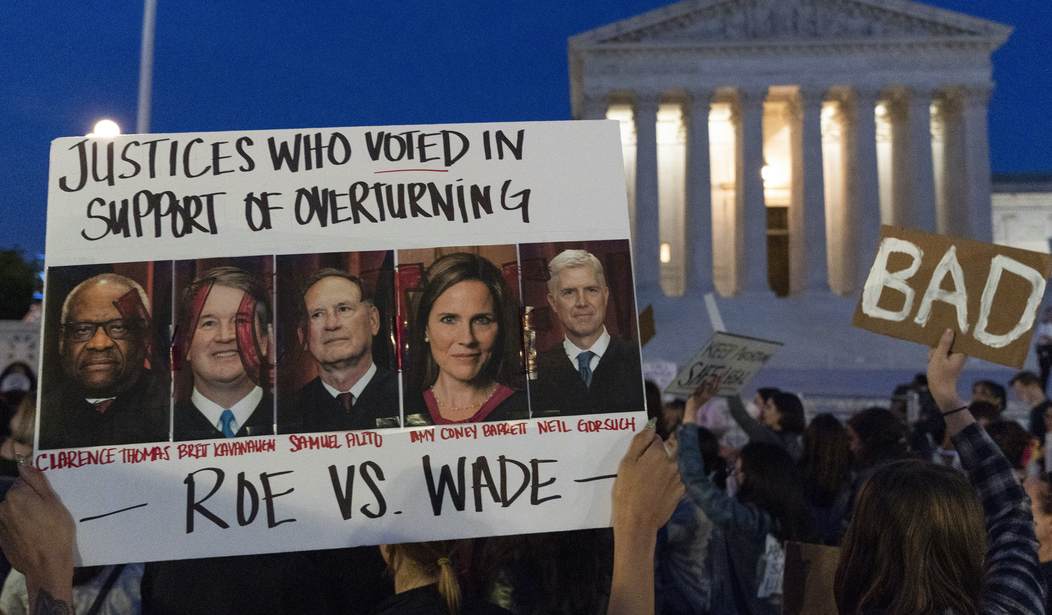If there’s any hope for Team Blue to hold back the red tsunami, a major backlash to Roe being overturned is it. According to multiple new polls out today, there’s a nonzero chance of that backlash forming.
Pretty close to zero, I’d guess, given the state of inflation and the economy. But not quite zero.
The big news comes from Gallup, which finds that the share of the population that calls itself “pro-choice” (55 percent) is now just a point shy of the highest number recorded since 1996 while the share that calls itself “pro-life” (39 percent) has reached a record low. On the related question of whether abortion is moral or not, you guessed it — also a record high:

In 20 years of polling, the number who say abortion is morally acceptable had never exceeded the number who call it morally wrong. That’s now changed: For the first time, the “morally acceptable” group is a majority of the population. That’s concerning. As is the fact that a 53/45 majority now say that abortion should be legal in most circumstances rather than illegal in most. A year ago, that split was 45/52.
More evidence of a backlash to the end of Roe lies in this new data from the Wall Street Journal, which finds another record being set:
Some 57% of respondents said a woman should be able to obtain a legal abortion if she wants it for any reason, the highest share since NORC began asking the question every few years starting in 1977. The share opposed to a woman having an abortion simply because she wants one, 41%, was the lowest on record. The poll’s 4 percentage point margin of error means that, while those results have changed significantly over time, they might not be statistically different from last year’s findings…
The WSJ-NORC poll showed broader support for abortion when women face health risks and financial challenges. A total of 86% of respondents supported abortion access if the mother’s health is at serious risk; 84% if the pregnancy is the result of rape or incest; and 76% if there is a strong chance of a serious birth defect. Fifty-nine percent said abortion should be possible if the family has a low income and can’t afford more children.
Exceptions for rape and incest draw heavy majority support, as you can see, yet some of the red-state bans being enacted don’t allow for those exceptions. That’s serious backlash fuel.
Echelon Insights also has new data out on abortion. They asked three questions of respondents: Do you call yourself pro-choice or pro-life? Do you want to overturn Roe or keep it? Do you support or oppose banning abortion after 15 weeks? The good news for Republicans is that relatively few Americans, 33 percent, gave the pro-abortion answer to all three. The bad news is that even fewer, 29 percent, gave the pro-life answer to all three. The reality, as has borne out in many surveys over the years, is that the balance of American opinion sits somewhere in the middle. Total abortion freedom, the current orthodoxy of the Democratic establishment, is unpopular. But so are total bans.
Now, let’s get to the “buts.”
The first “but” is that the surge in pro-choice identification noticed by Gallup is almost entirely driven by Democrats. Republicans and independents have barely budged over the past year; Dems, on the other hand, have leaped from 70 percent calling themselves “pro-choice” in 2021 to 88 percent doing so now. The looming demise of Roe at the Supreme Court, led by three Trump appointees, has lent a partisan tribal dynamic to this issue on the left that doesn’t exist to the same degree on the right. (More than 20 percent of Republicans call themselves “pro-choice” and 31 percent don’t want to see Roe overturned.) Bottom line: The end of Roe might not cost the GOP many votes in the middle.
Although if it drives Democratic turnout way, way up, then yeah, it’s a problem.
The second “but” is the fact that, despite Americans rallying to the pro-choice position in theory, in practice they remain skeptical of later-term abortions. Gallup again:

Support for second- and third-trimester abortions has risen gradually over the past decade but barely a third of the country approves of the former and just a fifth approves of the latter. Echelon also found solid support for banning most abortions after 15 weeks:
Here’s how opinion varies on abortion, from a pro-choice point of view
63 to 37 on upholding Roe
54 to 46 on pro-choice vs. pro-life
41 to 59 on a 15 week ban like Mississippi’s pic.twitter.com/OtR6EEKth9— Patrick Ruffini (@PatrickRuffini) June 2, 2022
The American middle will tolerate abortions early but recoil as a fetus becomes more recognizable as a baby. That’s a major concern for the Democrats’ radical “abortion until birth” dogma.
The final “but” is the fact that the polling on Roe itself hasn’t shifted. It’s unnvervingly steady over time, in fact, despite the many cultural changes and political realignments America has undergone in the last few decades:

There’s hardly been movement in 32 years of polling. We’d expect otherwise if a backlash to the Dobbs decision really were brewing, right? The imminent end of the Roe regime should be frightening fencesitters into the pro-Roe camp, sending those numbers upward. The fact that we’re not seeing that is a hopeful sign for the GOP.
But (here’s the “but” to the “buts”) only in that limited context. The fact that support for Roe has been polling remorselessly at around 60 percent for years means there should be a meaningful amount of unhappiness towards the GOP this summer. Hopefully not anything that won’t fizzle by November, but in a year that looks so promising for them, the end of Roe and the legislative overreach that will follow it are the two things they really do need to worry about.







